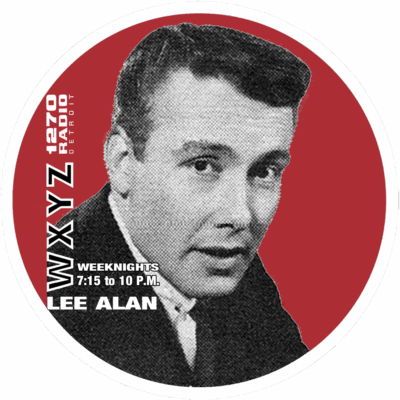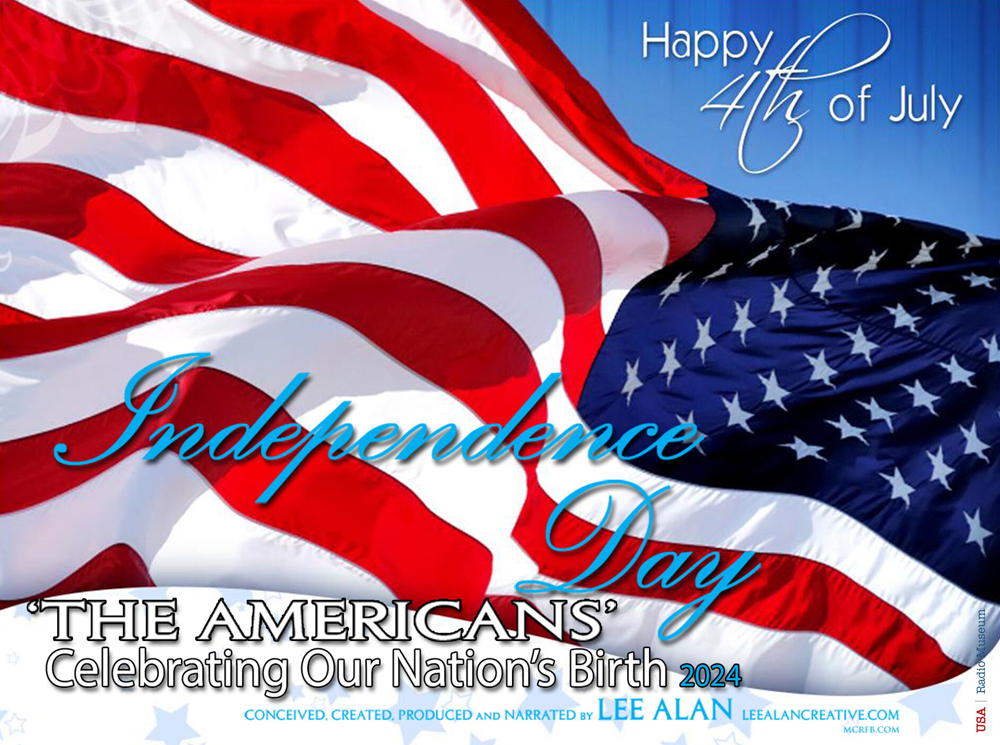“The Americans”: A Radiant Reflection of Patriotism Through Detroit’s Voice As fireworks lit the sky over Detroit and the nation this July 4th,
“The Americans”: A Radiant Reflection of Patriotism Through Detroit’s Voice
As fireworks lit the sky over Detroit and the nation this July 4th, one radio program ignited a different kind of light—one of remembrance, unity, and pride. The Americans, crafted and narrated by legendary broadcaster Lee Alan, stood as both a tribute to the American spirit and a masterful blend of storytelling and sound. Syndicated in the early 1990s and eventually heard on over 1,000 radio stations, including the Armed Forces Radio Network across 80 countries, The Americans became a beacon not only for Detroiters but for listeners worldwide.
A Patriot Before the Microphone
![]() Long before he became a fixture on Detroit’s airwaves, Lee Alan served in the U.S. Army during the late 1950s. That experience shaped more than his voice—it defined his perspective. The values of service, sacrifice, and duty weren’t abstract ideas; they were lived truths. His military chapter gave The Americans an unmistakable authenticity. When Lee spoke of patriotism, it wasn’t performance—it was personal.
Long before he became a fixture on Detroit’s airwaves, Lee Alan served in the U.S. Army during the late 1950s. That experience shaped more than his voice—it defined his perspective. The values of service, sacrifice, and duty weren’t abstract ideas; they were lived truths. His military chapter gave The Americans an unmistakable authenticity. When Lee spoke of patriotism, it wasn’t performance—it was personal.
That reverence infused every segment of the program. Alan didn’t simply broadcast history; he honored it. Through heartfelt narration and masterful production, he wove emotion into education, memory into music, and pride into poetry.
The Motor City Microphone: A Detroit Legacy
 Before The Americans echoed across the nation, Lee Alan’s voice was already Detroit-famous, shaping the golden soundscape of WXYZ during the 1960s. Born in 1934, Alan discovered radio’s magic at age 14, captivated by WXYZ’s own The Lone Ranger. That early spark guided him from Cooley High School to Wayne State University, and onward to a storied media career.
Before The Americans echoed across the nation, Lee Alan’s voice was already Detroit-famous, shaping the golden soundscape of WXYZ during the 1960s. Born in 1934, Alan discovered radio’s magic at age 14, captivated by WXYZ’s own The Lone Ranger. That early spark guided him from Cooley High School to Wayne State University, and onward to a storied media career.
His radio journey began at stations like WCAR, WJLB, and WJBK, where Alan’s overnight sets drew loyal listeners. After a brief military service in the U.S. Army, he returned briefly to WJLB and then WKMH before heading to Cincinnati. But fate—and WXYZ—called him home in 1962.
From that point forward, Alan became a staple of WXYZ-AM and WXYZ-TV, hosting iconic programs like Club 1270 (1963) and The Swingin’ Kind (1966). Known for his smooth style, rich baritone, and warm personality, Alan wasn’t just a voice—he was a companion to Detroit’s youth and families.
By April 1966, Alan had risen to the role of program director at WXYZ, where his influence shaped not just sound but staffing. It was during this tenure that he hired fellow broadcaster Jim Hampton, now co-publisher of the USA Radio Museum. That moment forged a partnership built on mentorship, friendship, and shared dedication to radio’s cultural power.
Even after Alan’s retirement in 1970, his voice remained ubiquitous—heard in advertising across Detroit and beyond, especially for car dealerships. His storytelling style never faded; it simply evolved with the times, still grounded in clarity, emotion, and trust.
This WXYZ chapter wasn’t a footnote—it was the foundation. It set the stage for The Americans and all that came after. And today, thanks to archivists like Jim Hampton and institutions like the USA Radio Museum, that legacy continues to broadcast loud and proud.
A Voice That Moved a Nation
Lee Alan was no stranger to evocative radio. Known for his iconic work during the golden age of Detroit AM radio, Alan brought a deep understanding of emotional cadence and cultural resonance to every broadcast. Yet The Americans was something different. As he shared in a heartfelt reflection on July 4, 2022, the production felt divinely guided:
“I absolutely believe that this production was divinely inspired and led… The music just found its way into the script… Everyone who was in it came to my studios and listened to it together for the first time. There were tears and some laughter.”
These words capture the essence of what The Americans delivered: a program so rooted in authenticity that it stirred emotions across generations and borders.
Built from Passion, Memory, and Music
The heart of The Americans pulsed with voices that were as personal as they were patriotic. Lee Alan didn’t craft the tribute alone—he gathered a mosaic of reflections, memories, and heartfelt testimony from friends, colleagues, and loved ones. Each contributor added depth and meaning, helping to shape a program that celebrated both the grandeur and intimacy of American identity.
Tom McIntyre, Alan’s closest friend and longtime radio journalist, shared raw, ad-libbed thoughts on freedom—his words unfiltered, authentic, and stirring. Byron MacGregor, famed for his powerful broadcast of “The Americans,” lent his voice to the program once again, infusing it with weight and historical resonance. General Norman Schwarzkopf added his own solemn reflection through a moving segment titled Portrait of Lincoln, a meditation on leadership, sacrifice, and national legacy.
Voices from everyday life brought further richness to the production. Announcer Joe Placido spoke of his grandparents’ journey to America, arriving at Ellis Island with hope and determination—offering a personal glimpse into the immigrant experience. Randy Stephenson conveyed the simple but powerful emotion he felt whenever he saw the flag raised at a baseball game, a quiet moment of national pride. Sharon Alan, Lee’s then-wife, painted scenes of backyard swimming pools and fireworks bursting overhead, adding nostalgic warmth to the tapestry of memory.
These voices, woven with music that seemed to find its way into the narrative as if by divine guidance, transformed The Americans into something more than a radio program—it became a chorus of personal truths, threaded together into one deeply American story. Each reflection reminded listeners of what it means to call this country home, inviting them to reflect, remember, and renew their appreciation for freedom’s promise.
Music That Spoke Without Word
![]() To Lee Alan, music wasn’t just background—it was the emotional architecture of The Americans. He selected each piece not for its volume, but for its ability to evoke sentiment, history, and memory without a single lyric. “Some of the music just found its way into the script,” Alan wrote, reflecting on how effortlessly these selections arrived and took root. “I didn’t go looking for it—it found me.”
To Lee Alan, music wasn’t just background—it was the emotional architecture of The Americans. He selected each piece not for its volume, but for its ability to evoke sentiment, history, and memory without a single lyric. “Some of the music just found its way into the script,” Alan wrote, reflecting on how effortlessly these selections arrived and took root. “I didn’t go looking for it—it found me.”
During the program’s development, Tom Ryan, CKLW producer, introduced Alan to compositions he had never heard before. These weren’t patriotic standards—they were evocative scores that carried quiet conviction. The moment Alan heard them, he knew they belonged. They landed in the program with uncanny precision, underscoring spoken tributes with grace that couldn’t be scripted.
One selection in particular became the spiritual core of the broadcast: “America… And The Dream Goes On.” To Alan, this piece captured everything—the persistence of the American idea, the quiet hope embedded in the country’s progress, and the belief that no matter the darkness, the dream would endure.
Alan himself once said that while it took months of hesitation to begin writing the program, the final creation came together in just three days. He often attributed this to divine inspiration. “It wasn’t just production,” he reflected. “It was something greater than me—something that needed to be heard.”
The music did more than fill silence—it shaped meaning. It elevated every story, softened every pause, and gave the broadcast its timeless breath. Veterans described feeling understood. Families described feeling connected. And thousands of listeners found in the score not just accompaniment—but kinship.
To this day, the melodies live on. This Fourth of July, as The Americans plays once more, those scores rise again—not through speakers, but through memory. And in that remembrance, the American dream still rings.
Sponsored by an American Auto Giant
The program was also uplifted through the power of partnership. At McIntyre’s urging, Alan connected with Bob Lutz, then-president of Chrysler Corporation, who saw the emotional power of the broadcast and supported it on 540 radio stations. Chrysler’s involvement wasn’t just promotional—it was philosophical.
As Lutz often emphasized in his work:
“The purpose of business isn’t just to make money. It’s to create something compelling enough that people feel it.”
That principle reflected perfectly in The Americans. Chrysler’s support symbolized the convergence of American enterprise and American storytelling—both rooted in pride, both committed to preserving culture. It was a reminder that patriotism could be powered not just by people, but by the institutions they built.
A Message Heard Around the World
 The reach of The Americans was not simply impressive—it was transcendent. As the voice of Lee Alan traveled through the Armed Forces Radio Network, the broadcast touched listeners in over 80 countries, spanning deserts, seas, mountaintops, and military bases tucked into corners of the globe. It arrived wherever an American flag waved, wherever duty called, and wherever homesickness whispered.
The reach of The Americans was not simply impressive—it was transcendent. As the voice of Lee Alan traveled through the Armed Forces Radio Network, the broadcast touched listeners in over 80 countries, spanning deserts, seas, mountaintops, and military bases tucked into corners of the globe. It arrived wherever an American flag waved, wherever duty called, and wherever homesickness whispered.
For many service members, the program became more than a patriotic message—it was a lifeline to home. On distant deployments, in mess halls and barracks, the familiar cadence of Alan’s voice stirred quiet reflection. It offered a break from routine, a pause to remember why they served, and a reminder of the loved ones waiting thousands of miles away.
Letters and messages poured in from veterans and active-duty personnel who recalled hearing the broadcast overseas:
“In Kandahar, July 4th felt far from home—until that voice came through the speakers. Suddenly, I wasn’t just a soldier. I was a son, a citizen. I was home in my heart.” — Lt. James O’Connor, U.S. Army
In an era before streaming and smartphones, radio was intimacy. The Americans leveraged that intimacy with elegance—delivering pride, memory, and hope in a format as portable as it was personal. Troops tuning in didn’t just hear voices—they felt values.
The program became an annual tradition among many military units, shared between ranks and replayed quietly in communal spaces. It gave Americans abroad a language for the emotions they often couldn’t articulate: duty, love, longing, and pride.
Lee Alan understood this power. In his July 2022 reflection, he wrote:
“Long after I am gone it will be playing somewhere… Hats Off to America.”
And so it has. Long after that first recording, The Americans continues to echo in hearts, headphones, and from the pages of history books. It’s no longer just a broadcast—it’s an American artifact, a sonic symbol of unity that has circled the globe and returned home with more meaning each year.
‘The Americans’ | Lee Alan | 1990
Audio Digitally Remastered by USA Radio Museum
Farewell to a Voice, But Not to a Message
On October 29, 2024, just seven days before what would have been his 90th birthday, America lost one of its most quietly powerful voices: Lee Alan, the veteran broadcaster whose reverent tones had for decades stitched patriotism into the hearts of listeners. His passing, while expected by those closest to him, still carried weight far beyond Detroit—echoing through studio halls, inboxes of fans, and the minds of those who had once listened while standing still, hand on heart.
The farewell was solemn, yes.
But Alan’s final wish was neither elaborate nor self-serving. It was profoundly American in its humility: that the program be shared each year, without fail, as a living reminder of the country’s promise. His broadcast gave Americans a moment to pause, reflect, and feel. His military service gave those words weight. And his legacy ensures that each July 4th, someone somewhere will hear The Americans—and remember. Thanks to Motor City Radio Flashbacks, this wish was—and continues to be—fulfilled. The annual re-airing of The Americans transformed the broadcast from a one-time production into a cultural ritual, a time capsule of patriotism, a musical monument to unity, and a spiritual salute to freedom.
Though Alan’s studio chair now sits empty, his message remains seated in the soul of the nation.
His Final Words Echo Still
Through The Americans, Lee Alan didn’t just offer perspective. He offered his reflections about love of country—one polished with history, emotion, and hope—where listeners could look in and rediscover who they are, and who they strive to become.
And in that quiet clarity, his patriotism continues to shine—not in sound waves, but in memory to the land he so loved.
Hats Off to America. Hats Off to the Memory of Lee Alan.
Gone, but never unheard.
_____________________
A USARM Viewing Tip: On your PC? Mouse/click over each image for expanded views. On your mobile or tablet device? Finger-tap all the above images inside the post and stretch image across your device’s screen for LARGEST digitized view.

